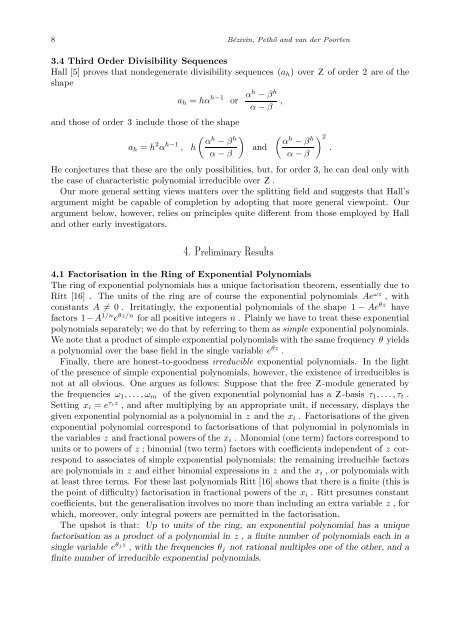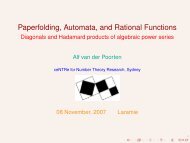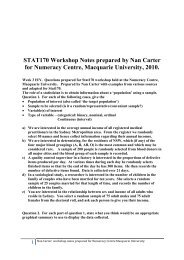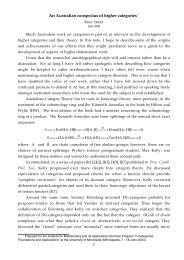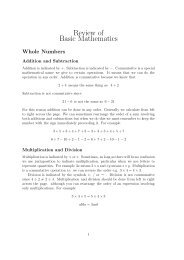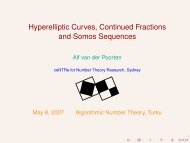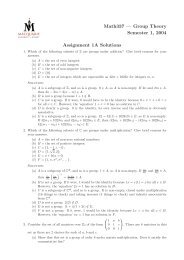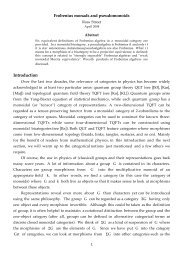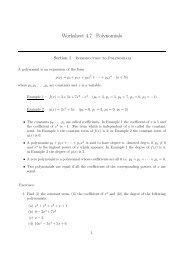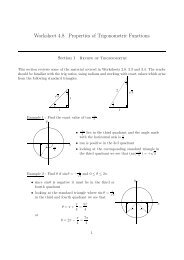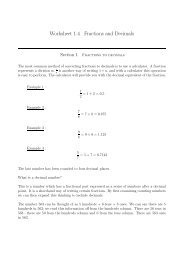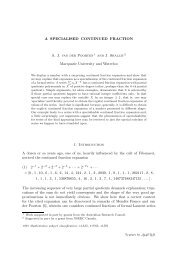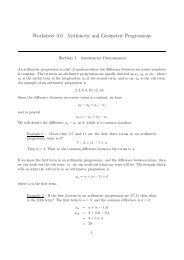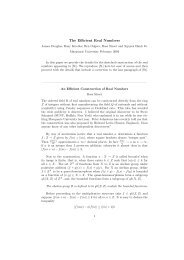A FULL CHARACTERISATION OF DIVISIBILITY SEQUENCES ...
A FULL CHARACTERISATION OF DIVISIBILITY SEQUENCES ...
A FULL CHARACTERISATION OF DIVISIBILITY SEQUENCES ...
You also want an ePaper? Increase the reach of your titles
YUMPU automatically turns print PDFs into web optimized ePapers that Google loves.
8 Bézivin, Pethő and van der Poorten<br />
3.4 Third Order Divisibility Sequences<br />
Hall [5] proves that nondegenerate divisibility sequences (ah) over Z of order 2 are of the<br />
shape<br />
ah = hα h−1 or αh − βh α − β ,<br />
and those of order 3 include those of the shape<br />
ah = h 2 α h−1 2<br />
h h<br />
h h<br />
α − β α − β<br />
, h<br />
and<br />
.<br />
α − β<br />
α − β<br />
He conjectures that these are the only possibilities, but, for order 3, he can deal only with<br />
the case of characteristic polynomial irreducible over Z .<br />
Our more general setting views matters over the splitting field and suggests that Hall’s<br />
argument might be capable of completion by adopting that more general viewpoint. Our<br />
argument below, however, relies on principles quite different from those employed by Hall<br />
and other early investigators.<br />
4. Preliminary Results<br />
4.1 Factorisation in the Ring of Exponential Polynomials<br />
The ring of exponential polynomials has a unique factorisation theorem, essentially due to<br />
Ritt [16] . The units of the ring are of course the exponential polynomials Ae ωz , with<br />
constants A = 0 . Irritatingly, the exponential polynomials of the shape 1 − Ae θz have<br />
factors 1−A 1/n e θz/n for all positive integers n . Plainly we have to treat these exponential<br />
polynomials separately; we do that by referring to them as simple exponential polynomials.<br />
We note that a product of simple exponential polynomials with the same frequency θ yields<br />
a polynomial over the base field in the single variable e θz .<br />
Finally, there are honest-to-goodness irreducible exponential polynomials. In the light<br />
of the presence of simple exponential polynomials, however, the existence of irreducibles is<br />
not at all obvious. One argues as follows: Suppose that the free Z-module generated by<br />
the frequencies ω1, ...,ωm of the given exponential polynomial has a Z-basis τ1, ...,τt .<br />
Setting xi = e τiz , and after multiplying by an appropriate unit, if necessary, displays the<br />
given exponential polynomial as a polynomial in z and the xi . Factorisations of the given<br />
exponential polynomial correspond to factorisations of that polynomial in polynomials in<br />
the variables z and fractional powers of the xi . Monomial (one term) factors correspond to<br />
units or to powers of z ; binomial (two term) factors with coefficients independent of z correspond<br />
to associates of simple exponential polynomials; the remaining irreducible factors<br />
are polynomials in z and either binomial expressions in z and the xi , or polynomials with<br />
at least three terms. For these last polynomials Ritt [16] shows that there is a finite (this is<br />
the point of difficulty) factorisation in fractional powers of the xi . Ritt presumes constant<br />
coefficients, but the generalisation involves no more than including an extra variable z , for<br />
which, moreover, only integral powers are permitted in the factorisation.<br />
The upshot is that: Up to units of the ring, an exponential polynomial has a unique<br />
factorisation as a product of a polynomial in z , a finite number of polynomials each in a<br />
single variable e θjz , with the frequencies θj not rational multiples one of the other, and a<br />
finite number of irreducible exponential polynomials.


